- Home
- C. L. Moore
No Boundaries
No Boundaries Read online
NO BOUNDARIES
Henry Kuttner and C.L. Moore
www.sf-gateway.com
Enter the SF Gateway …
In the last years of the twentieth century (as Wells might have put it), Gollancz, Britain’s oldest and most distinguished science fiction imprint, created the SF and Fantasy Masterworks series. Dedicated to re-publishing the English language’s finest works of SF and Fantasy, most of which were languishing out of print at the time, they were – and remain – landmark lists, consummately fulfilling the original mission statement:
‘SF MASTERWORKS is a library of the greatest SF ever written, chosen with the help of today’s leading SF writers and editors. These books show that genuinely innovative SF is as exciting today as when it was first written.’
Now, as we move inexorably into the twenty-first century, we are delighted to be widening our remit even more. The realities of commercial publishing are such that vast troves of classic SF & Fantasy are almost certainly destined never again to see print. Until very recently, this meant that anyone interested in reading any of these books would have been confined to scouring second-hand bookshops. The advent of digital publishing has changed that paradigm for ever.
The technology now exists to enable us to make available, for the first time, the entire backlists of an incredibly wide range of classic and modern SF and fantasy authors. Our plan is, at its simplest, to use this technology to build on the success of the SF and Fantasy Masterworks series and to go even further.
Welcome to the new home of Science Fiction & Fantasy. Welcome to the most comprehensive electronic library of classic SFF titles ever assembled.
Welcome to the SF Gateway.
Contents
Title Page
Gateway Introduction
Contents
Preface
Vintage Season
The Devil We Know
Home There’s No Returning
Exit the Professor
Two-Handed Engine
Website
Also by C. L. Moore
Author Bio
Copyright
“Henry Kuttner and C. L. Moore bring to science fiction the surrealistic but logical vividness of the best fantasy. They are among the most imaginative, technically skilled and literarily adroit of all today’s science-fantasy writers.”
H. H. Holmes, New York Herald-Tribune.
This new collection substantiates Mr. Holmes’s opinion richly and exciting. Here is an anthology that explores the furthest reaches of imagination and the closest areas of emotion with power and with humour and with a sense of human purpose. This is Kuttner-Moore at their best.
VINTAGE SEASON
THREE people came up the walk to the old mansion just at dawn on a perfect May morning. Oliver Wilson in his pyjamas watched them from an upper window through a haze of conflicting emotions, resentment predominant. He didn’t want them there.
They were foreigners. He knew only that much about them. They had the curious name of Sancisco, and their first names, scrawled in loops on the lease, appeared to be Omerie, Kleph and Klia, though it was impossible as he looked down upon them to sort them out by signature. He hadn’t even been sure whether they would be men or women, and he had expected something a little less cosmopolitan.
Oliver’s heart sank a little as he watched them follow the taxi driver up the walk. He had hoped for less self-assurance in his unwelcome tenants, because he meant to force them out of the house if he could. It didn’t look very promising from here.
The man went first. He was tall and dark, and he wore his clothes and carried his body with that peculiar arrogant assurance that comes from perfect confidence in every phase of one’s being. The two women were laughing as they followed him. Their voices were light and sweet, and their faces were beautiful, each in its own exotic way, but the first, thing Oliver thought of when he looked at them was, Expensive!
It was not only that patina of perfection that seemed to dwell in every line of their incredibly flawless garments. There are degrees of wealth beyond which wealth itself ceases to have significance. Oliver had seen before, on rare occasions, something like this assurance that the earth turning beneath their well-shod feet turned only to their whim.
It puzzled him a little in this case, because he had the feeling as the three came up the walk that the beautiful clothing they wore so confidently was not clothing they were accustomed to. There was a curious air of condescension in the way they moved. Like women in costume. They minced a little on their delicate high heels, held out an arm to stare at the cut of a sleeve, twisted now and then inside their garments as if the clothing sat strangelon them, as if they were accustomed to something entirely different.
And there was an elegance about the way the garments fitted them which even to Oliver looked strikingly unusual. Only an actress on the screen, who can stop time and the film to adjust every disarrayed fold so that she looks perpetually perfect, might appear thus elegantly clad. But let these women move as they liked, and each fold of their clothing followed perfectly with the movement and fell perfectly into place again. One might almost suspect the garments were not cut of ordinary cloth, or that they were cut according to some unknown, subtle scheme, with many artful hidden seams placed by a tailor incredibly skilled at his trade.
They seemed excited. They talked in high, clear, very sweet voices, looking up at the perfect blue and transparent sky in which dawn was still frankly pink. They looked at the trees on the lawn, the leaves translucently green with an under colour of golden newness, the edges crimped from constriction in the recent bud.
Happily and with excitement in their voices they called to the man, and when he answered his own voice blended so perfectly in cadence with theirs that it sounded like three people singing together. Their voices, like their clothing, seemed to have an elegance far beyond the ordinary, to be under a control such as Oliver Wilson had never dreamed of before this morning.
The taxi driver brought up the luggage, which was of a beautiful pale stuff that did not look quite like leather, and had curves in it so subtle it seemed square until you saw how two or three pieces of it fitted together when carried into a perfectly balanced block. It was scuffed, as if from much use. And though there was a great deal of it, the taxi man did not seem to find his burden heavy. Oliver saw him look down at it now and then and heft the, weight incredulously.
One of the women had very black hair and skin like cream, and smoke-blue eyes heavy-lidded with the weight of her lashes. It was the other woman Oliver’s gaze followed as she came up the walk. Her hair was a clear, pale red, and her face had a softness that he thought would be like velvet to touch. She was tanned to a warm amber darker than her hair.
Just as they reached the porch steps the fair woman lifted her head and looked up. She gazed straight into Oliver’s eyes and he saw that hers were very blue, and just a little amused, as if she had known he was there all along. Also they were frankly admiring.
Feeling a bit dizzy, Oliver hurried back to his room to dress.
“We are here on a vacation,” the dark man said, accepting the keys. “We will not wish to be disturbed, as I made clear in our correspondence. You have engaged a cook and housemaid for us, I understand? We will expect you to move your own belongings out of the house, then, and——”
“Wait,” Oliver said uncomfortably. “Something’s come up. I——” He hesitated, not sure just how to present it. These were such increasingly odd people. Even their speech was odd. They spoke so distinctly, not slurring any of the words into contractions. English seemed as familiar to them as a native tongue, but they all spoke as tained singers sing, with perfect breath control and voice placement.
And there was a coldness in the man’s v
oice, as if some gulf lay between him and Oliver, so deep no feeling of human contact could bridge it.
“I wonder,” Oliver said, “if I could find you better living quarters somewhere else in town. There’s a place across the street that——”
The dark woman said, “Oh, no!” in a lightly horrified voice, and all three of them laughed. It was cool, distant laughter that did not include Oliver.
The dark man said, “We chose this house carefully, Mr. Wilson. We would not be interested in living anywhere else.”
Oliver said desperately, “I don’t see why. It isn’t even a modern house. I have two others in much better condition. Even across the street you’d have a fine view of the city. Here there isn’t anything. The other houses cut off the view, and——”
“We engaged rooms here, Mr. Wilson,” the man said with finality. “We expect to use them. Now will you make arrangements to leave as soon as possible?”
Oliver said, “No,” and looked stubborn. “That isn’t in the lease. You can live here until next month, since you paid for it, but you can’t put me out. I’m staying.”
The man opened his mouth to say something. He looked coldly at Oliver and closed it again. The feeling of aloofness was chill between them. There was a moment’s silence. Then the man said, “Very well. Be kind enough to stay out of our way.”
It was a little odd that he didn’t inquire into Oliver’s motives. Oliver was not yet sure enough of the man to explain. He couldn’t very well say, “Since the lease was signed, I’ve been offered three times what the house is worth if I’ll sell it before the end of May.” He couldn’t say, “I want the money, and I’m going to use my own nuisance-value to annoy you until you’re willing to move out.” After all, there seemed no reason why they shouldn’t. After seeing them, there seemed doubly no reason, for it was clear they must be accustomed to surroundings infinitely better than this timeworn old house.
It was very strange, the value this house had so suddenly acquired. There was no reason at all why two groups of semi-anonymous people should be so eager to possess it for the month of May.
In silence Oliver showed his tenants upstairs to the three big bedrooms across the front of the house. He was intensely conscious of the red-haired woman and the way she watched him with a sort of obviously covert interest, quite warmly, and with a curious undertone to her interest that he could not quite place. It was familiar, but elusive. He thought how pleasant it would be to talk to her alone, if only to try to capture that elusive attitude and put a name to it.
Afterward ht’nt down to the telephone and called his fiancée.
Sue’s voice squeaked a little with excitement over the wire.
“Oliver, so early? Why, it’s hardly six yet. Did you tell them what I said? Are they going to go?”
“Can’t tell yet. I doubt it. After all, Sue, I did take their money, you know.”
“Oliver, they’ve got to go! You’ve got to do something!”
“I’m trying, Sue. But I don’t like it.”
“Well, there isn’t any reason why they shouldn’t stay somewhere else. And we’re going to need that money. You’ll just have to think of something, Oliver.”
Oliver met his own worried eyes in the mirror above the telephone and scowled at himself. His straw-coloured hair was tangled and there was a shining stubble on his pleasant, tanned face. He was sorry the red-haired woman had first seen him in his untidy condition. Then his conscience smote him at the sound of Sue’s determined voice and he said:
“I’ll try, darling. I’ll try. But I did take their money.”
They had, in fact, paid a great deal of money, considerably more than the rooms were worth even in that year of high prices and high wages. The country was just moving into one of those fabulous eras which are later referred to as the Gay Forties or the Golden Sixties—a pleasant period of national euphoria. It was a stimulating time to be alive—while it lasted.
“All right,” Oliver said resignedly. “I’ll do my best.”
But he was conscious, as the next few days went by, that he was not doing his best. There were several reasons for that. From the beginning the idea of making himself a nuisance to his tenants had been Sue’s, not Oliver’s. And if Oliver had been a little determined the whole project would never have got under way. Reason was on Sue’s side, but——
For one thing, the tenants were so fascinating. All they said and did had a queer sort of inversion to it, as if a mirror had been held up to ordinary living and in the reflection showed strange variations from the norm. Their minds worked on a different basic premise, Oliver thought, from his own. They seemed to derive covert amusement from the most unamusing things; they patronized, they were aloof with a quality of cold detachment which did not prevent them from laughing inexplicably far too often for Oliver’s comfort.
He saw them occasionally, on their way to and from their rooms. They were polite and distant, not, he suspected from anger at his presence but from sheer indifference.
Most of the day they spent out of the house. The perfect May weather held unbroken and they seemed to give themselves up wholeheartedly to admation of it, entirely confident that the warm, pale-gold sunshine and the scented air would not be interrupted by rain or cold. They were so sure of it that Oliver felt uneasy.
They took only one meal a day in the house, a late dinner. And their reactions to the meal were unpredictable. Laughter greeted some of the dishes, and a sort of delicate disgust others. No one would touch the salad, for instance. And the fish seemed to cause a wave of queer embarrassment around the table.
They dressed elaborately for each dinner. The man—his name was Omerie—looked extremely handsome in his dinner clothes but he seemed a little sulky and Oliver twice heard the women laughing because he had to wear black. Oliver entertained a sudden vision, for no reason, of the man in garments as bright and as subtly cut as the women’s, and it seemed somehow very right for him. He wore even the dark clothing with a certain flamboyance, as if cloth-of-gold would be more normal for him.
When they were in the house at other mealtimes, they ate in their rooms. They must have brought a great deal of food with them, from whatever mysterious place they had come. Oliver wondered with increasing curiosity where it might be. Delicious odours drifted into the hall sometimes, at odd hours, from their closed doors. Oliver could not identify them, but almost always they smelled irresistible. A few times the food smell was rather shockingly unpleasant, almost nauseating. It takes a connoisseur, Oliver reflected, to appreciate the decadent. And these people, most certainly, were connoisseurs.
Why they lived so contentedly in this huge ramshackle old house was a question that disturbed his dreams at night. Or why they refused to move. He caught some fascinating glimpses into their rooms, which appeared to have been changed almost completely by additions he could not have defined very clearly from the brief sights he had of them. The feeling of luxury which his first glance at them had evoked was confirmed by the richness of the hangings they had apparently brought with them, the half-glimpsed ornaments, the pictures on the walls, even the whiffs of exotic perfume that floated from half-open doors.
He saw the women go by him in the halls, moving softly through the brown dimness in their gowns so uncannily perfect in fit, so lushly rich, so glowingly coloured they seemed unreal. That poise born of confidence in the subservience of the world gave them an imperious aloofness, but more than once Oliver, meeting the blue gaze of the woman with the red hair and the soft, tanned skin, thought he saw quickened interest there. She smiled at him in the dimness and went by in a haze of fragrance and a halo of incredible richness, and the warmth of the smile lingered after she had gone.
He knew she did not mean this aloofness to last between them. From the very first he was sure of that. When the time came she would make the opportunity to be alone with him. The thought was confusing and tremendously exciting. There was nothing he could do but wait, knowing she would see him when it suited
her.
On the third day he lunched with Sue in a little downtown restaurant overlooking the great sweep of the metropolis across the river far below. Sue had shining brown curls and brown eyes, and her chin was a bit more prominent than is strictly accordant with beauty. From childhood Sue had known what she wanted and how to get it, andit seemed to Oliver just now that she had never wanted anything quite so much as the sale of this house.
“It’s such a marvellous offer for the old mausoleum,” she said, breaking into a roll with a gesture of violence. “We’ll never have a chance like that again, and prices are so high we’ll need the money to start housekeeping. Surely you can do something, Oliver!”
“I’m trying,” Oliver assured her uncomfortably.
“Have you heard anything more from that madwoman who wants to buy it?”
Oliver shook his dead. “Her attorney phoned again yesterday. Nothing new. I wonder who she is.”
“I don’t think even the attorney knows. All this mystery—I don’t like it, Oliver. Even those Sancisco people—What did they do today?”
Oliver laughed. “They spent about an hour this morning telephoning movie theatres in the city, checking up on a lot of third-rate films they want to see parts of.”
“Parts of? But why?”
“I don’t know. I think … oh, nothing. More coffee?”
The trouble was, he thought he did know. It was too unlikely a guess to tell Sue about, and without familiarity with the Sancisco oddities she would only think Oliver was losing his mind. But he had from their talk, a definite impression that there was an actor in bit parts in all these films whose performances they mentioned with something very near to awe. They referred to him as Golconda, which didn’t appear to be his name, so that Oliver had no way of guessing which obscure bit-player it was they admired so deeply. Golconda might have been the name of a character he had once played—and with superlative skill, judging by the comments of the Sanciscos—but to Oliver it meant nothing at all.

 The Complete Jirel of Joiry
The Complete Jirel of Joiry Quest of the Starstone
Quest of the Starstone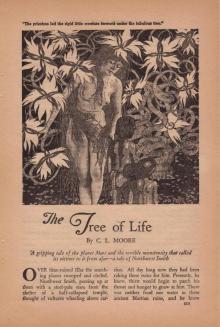 The Tree of Life
The Tree of Life Judgment Night
Judgment Night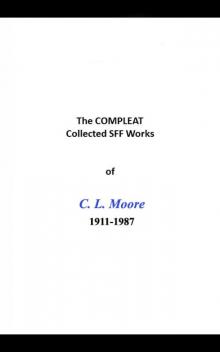 The COMPLEAT Collected SFF Works 1911-1987
The COMPLEAT Collected SFF Works 1911-1987 Northwest of Earth
Northwest of Earth No Boundaries
No Boundaries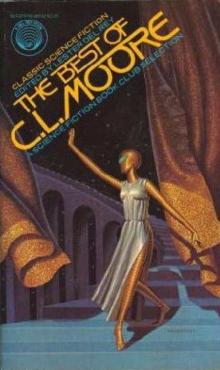 The Best of C. L. Moore
The Best of C. L. Moore Doomsday Morning M
Doomsday Morning M Shambleau and Others M
Shambleau and Others M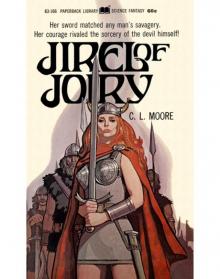 Jirel of Joiry
Jirel of Joiry Judgment Night M
Judgment Night M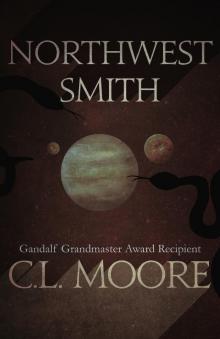 Northwest Smith
Northwest Smith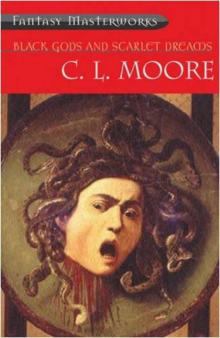 Black Gods and Scarlet Dreams
Black Gods and Scarlet Dreams